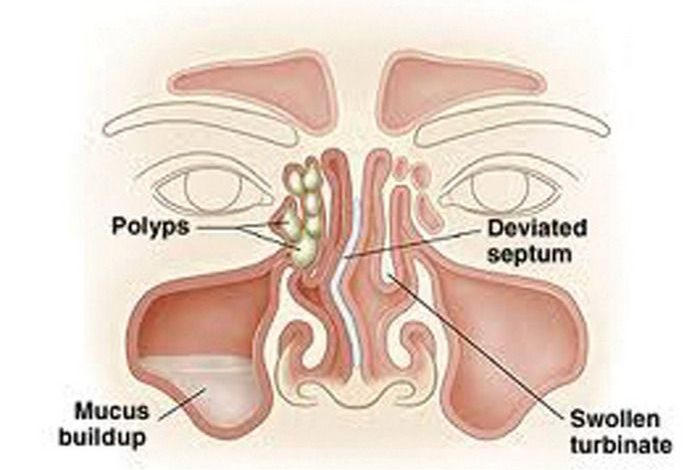

Ear, Nose & Throat Care
By Dr Rekha Balachandran


Nasal block or congestion can cause a strange sounding speech called a “hyponasal speech” and a dry throat in the mornings from breathing through the mouth all night. This can present as:
- Persistent block on one or both sides of the nose
- Nasal block that changes with position, (block on the left side when sleeping on left or vice versa)
- Occurs with other allergy symptoms like sneezing, runny nose, itchiness
- Associated with symptoms of polyps such as inability to smell, headaches
- Arises secondary to infections like a cold or sinus infections.
Each of these symptoms can point to different possible causes. All of them except the common cold will need further investigations.
Turbinate hypertrophy/enlargement
This is the commonest cause of nasal block. Turbinates (of which there are three in the nose) are shelves of bone at the side of the nose. This bone is covered by flesh (called mucosa) that is vascular and can vary tremendously in thickness. This enlargement is due to underlying allergies and usually causes nasal block on both sides that can increase with change of position. This can be treated by controlling underlying allergies. Of course, surgical reduction of the turbinate may also be advocated if the block is severe and the enlargement is significant.
Deviated nasal septum
The nasal septum is the thin piece of cartilage and bone the separates the two sides of the nose from each other. This septum can sometimes be bent into a ‘C’ or ‘S’ shape causing one or both sides to narrow. This causes a persistent one sided nose block that may worsen over time. This type of block does not improve much with medication and may also contribute to headaches or sinus infections on the narrowed side. A symptomatic deviated septum is best treated with surgical correction.
Nasal polyps
Polyps are grape like growths that occur inside the nose. Most of these polyps are not cancerous although a small percentage may be precancerous. The cause of these polyps can range from infection to allergies. They are characterised by nasal block, a complete or reduced sense of smell and a feeling of pressure or headaches. The diagnosis of nasal polyps is made by using a small nasal scope. To provide immediate relief, a course of nasal and oral steroids with or without antibiotics will help. Many people with nasal polyps will require surgery to remove the existing polyps and may need to take medication to prevent their recurrence. Allergy testing may help to identify if the polyps are allergic in nature and avoiding the allergens may reduce the chance of the polyps growing back.
In conclusion, nasal block can be caused by many different factors, some more serious than others. If the nasal block is continuous and troubling in nature, it is advised to seek medical advice.


